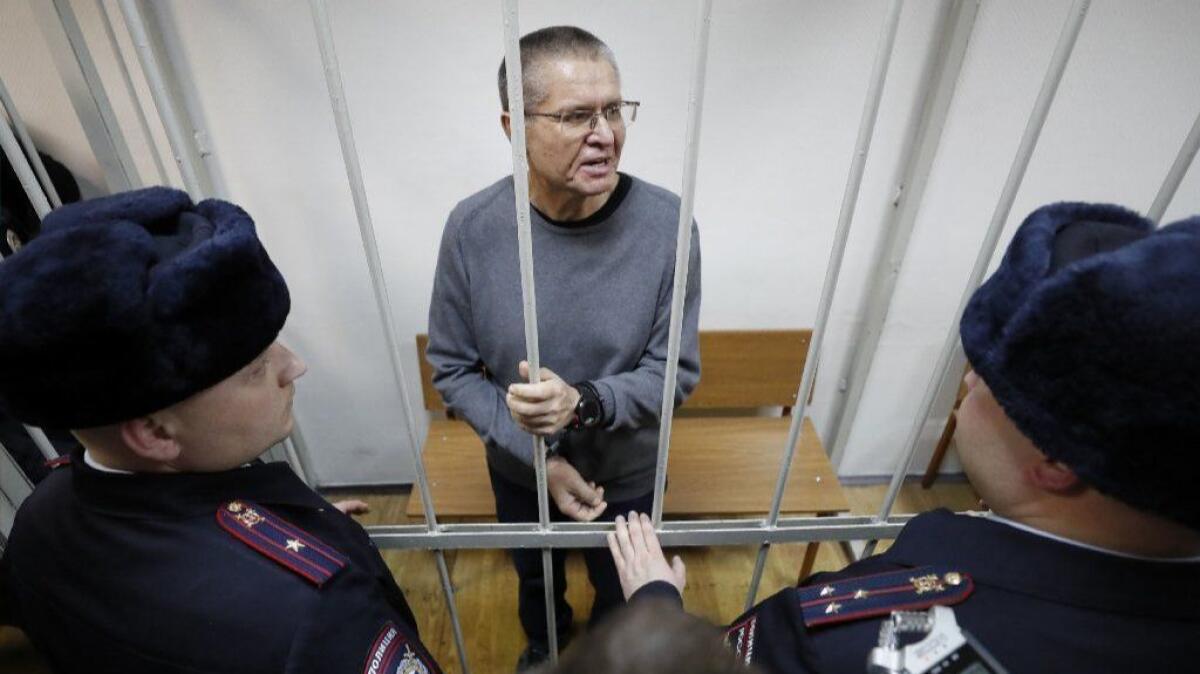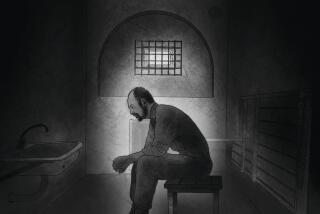Conviction of ex-minister in Russia points to Kremlin infighting

Alexei Ulyukayev, 62, is the highest-ranking Russian official to stand trial in post-Soviet Russia. (Dec. 15, 2017) (Sign up for our free video newsletter here http://bit.ly/2n6VKPR)
A Russian court Friday sentenced a former economy minister to eight years in a high-security prison on accusations that he took a $2-million bribe from a Kremlin aide close to Russian President Vladimir Putin.
The trial against Alexei Ulyukayev points to what many analysts think could be signs of internal power struggles in the Kremlin. Putin, 65, will face reelection next year, and by all expectations, he will win and rule for another six years until 2024. That will make him the longest-serving Russian leader since Stalin.
But who will replace him remains unanswered, and analysts think the case against Ulyukayev may indicate that the Kremlin’s inner circle already is working to fill Putin’s chair after his departure.
Ulyukayev, 62, is the highest-ranking Russian official to stand trial in post-Soviet Russia. Prosecutors said Ulyukayev extorted a bribe from state oil firm Rosneft to give his approval on the purchase of another oil company. He was arrested in November 2016 at Rosneft’s headquarters during a sting operation orchestrated by the Federal Security Service, the successor agency to the Soviet KGB.
Ulyukayev has denied the charges and said he was set up by Igor Sechin, Putin’s close ally and the head of Rosneft, Russia’s largest oil company. Sechin is considered to be one of the Russian president’s closest advisors. He is widely believed to be a top figure in the “siloviki,” a term used to describe Putin’s inner circle of former security service agents-turned-political elite.
Russia’s constitution forbids Putin from running after 2024, leaving open the question of who will be his successor. Analysts think many in his inner circle could be jockeying to make sure they are part of that decision-making process, including Sechin.
“Everything that happens now in Russia is under the sign of political transition,” said Alexander Baunov, a senior fellow at the Carnegie Moscow Center. “Of course the struggle begins as the bureaucracy is making choices with whom to link. Near Putin’s court, we will see the birth of smaller courts of those who want to be the next president or those who want to be the next president-maker.”
As the head of Rosneft, Sechin had pushed for the company’s purchase of Bashneft, another smaller state oil company. As economic minister, Ulyukayev had been critical of the purchase, but Rosneft needed his ministry’s approval to go through with the sale.

According to court testimony, Sechin asked Ulyukayev to come to the Rosneft offices on Nov. 15, where he was presented with a gift basket containing sausages and what Ulyukayev has testified he thought were bottles of wine. Sechin instructed Ulyukayev to take the “basket with sausages,” a phrase that has now become a popular meme in Russia.
Instead of wine, the basket contained a bag with $2 million in cash. Security agents detained Ulyukayev as he was leaving the Rosneft building and later placed him under house arrest as he awaited trial.
Ulyukayev has said he thinks Sechin, who still has close ties to the security service agency, was behind the sting operation.
The judge called Sechin to court four times to testify during the hearings, but he never appeared. Each time he gave a different excuse about having a busy schedule until the end of 2017. On Nov. 22, judge Larisa Semyonov said Sechin’s excuses were acceptable, saying that letters from his office explained that “he has a complex schedule that is set in advance.”
Although Ulyukayev was in Putin’s cabinet as economic minister, he was not considered part of the “siloviki” and was seen as a liberal economist among Putin’s more conservative advisors.
This case is not about a struggle of the state against corruption, but rather a struggle inside the elite, Baunov said.
On one side, you have a group within the political elite who wants Russia to have democracy, or at least working, bureaucratic institutions that are real and not just a façade, Baunov said. Sechin prefers more informal procedures, in which the most important decisions and appointments be taken in a more informal, hidden way, he said.
The sentence was surprisingly harsh as it is the first time an acting member of the federal government has been convicted. It shows that the informal side of the political elite’s decision-making is still stronger in Russia than its legal façade, Baunov said.
“Now, any person in the highest bureaucracy can see how risky it is to stay in Sechin’s way,” Baunov said.
In his dramatic closing statements last week, Ulyukayev compared the court hearings to Stalin-era show trials.
“An elderly gladiator at retirement age defends himself with a cardboard sword, and people sit back to watch the whole thing happily from their comfy seats,” he said. “Whether the thumb points up or down will decide his sentence. It was said long ago for whom the bell tolls. I want to say now that the bell could start tolling for any of you.”
Ayres is a special correspondent.
Twitter: @sabraayres
More to Read
Start your day right
Sign up for Essential California for news, features and recommendations from the L.A. Times and beyond in your inbox six days a week.
You may occasionally receive promotional content from the Los Angeles Times.







